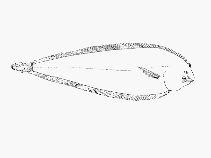Austroglossus microlepis (Bleeker, 1863)
West coast sole
添加你自己的观测位置在 Fish Watcher
| Native range | All suitable habitat | Point map | Year 2050 |

|
| This map was computer-generated and has not yet been reviewed. |
| Austroglossus microlepis AquaMaps Data sources: GBIF OBIS |
Common names from other countries
分类 / Names 俗名 | 同种异名 | Catalog of Fishes(属, 种) | ITIS | CoL | WoRMS | Cloffa
Teleostei > Pleuronectiformes (Flatfishes) > Soleidae (Soles)
Etymology: Austroglossus: Composed from Austro = the south + Greek, glossa = tongue (Ref. 45335).
More on author: Bleeker.
Etymology: Austroglossus: Composed from Austro = the south + Greek, glossa = tongue (Ref. 45335).
More on author: Bleeker.
Environment: milieu / climate zone / depth range / distribution range 生态学
海洋 深海底的; 深度上下限 100 - 400 m (Ref. 5304). 深水域; 17°S - 35°S, 10°E - 25°E
分布 国家 | FAO区域 | 生态系 | 标本纪录 | Point map | 简介 | Faunafri
Southeast Atlantic: northern Namibia to False Bay, South Africa.
東南大西洋: 北方的那米比亞到南非佛斯灣。
東南大西洋: 北方的那米比亞到南非佛斯灣。
大小 / 重量 / 年龄
Maturity: Lm ? range ? - ? cm
Max length : 75.0 cm TL 雄鱼/尚未辨别雌雄; (Ref. 3200); 最大体重: 4.0 kg (Ref. 3200)
Max length : 75.0 cm TL 雄鱼/尚未辨别雌雄; (Ref. 3200); 最大体重: 4.0 kg (Ref. 3200)
简单描述 检索表 | 型态特徵 | 形态测量图
背棘 (总数) : 0; 背的软条 (总数) : 82 - 100; 臀棘: 0; 臀鳍软条: 65 - 78; 脊椎骨: 55 - 57. Dorsal and anal fins continuous with caudal fin (Ref. 36731). Right pectoral fin more than half of, but shorter than head length; left pectoral fin present (Ref. 36731). Brownish with small dark specks; sometimes with bars on body (Ref. 3200).
背鳍与臀鳍与尾鳍续接在一起。 (参考文献 36731) 右边的胸鳍超过一半的, 但是短于头长; 左边的胸鳍呈现。 (参考文献 36731) 褐色的有小深色的斑点; 在身体上有时有横带。 (参考文献 3200)
背鳍与臀鳍与尾鳍续接在一起。 (参考文献 36731) 右边的胸鳍超过一半的, 但是短于头长; 左边的胸鳍呈现。 (参考文献 36731) 褐色的有小深色的斑点; 在身体上有时有横带。 (参考文献 3200)
Larvae are pelagic (Ref. 27121, Ref. 36731), while adults live close to the sea bed (Ref. 36731). Adults feed on worms, crustaceans, mollusks, and fish (Ref. 27121, Ref. 36731). Utilized as a food fish (Ref. 4931).
仔鱼是大洋性的 (参考文献 27121, 参考文献 36731), 虽然成鱼接近海床生活。 (参考文献 36731) 成鱼吃蠕虫,甲壳动物,软件动物与鱼。 (参考文献 27121, 参考文献 36731) 作为食用鱼.(参考文献 4931)
仔鱼是大洋性的 (参考文献 27121, 参考文献 36731), 虽然成鱼接近海床生活。 (参考文献 36731) 成鱼吃蠕虫,甲壳动物,软件动物与鱼。 (参考文献 27121, 参考文献 36731) 作为食用鱼.(参考文献 4931)
Life cycle and mating behavior 成熟度 | 繁殖 | 产卵场 | 卵 | 孕卵数 | 仔鱼
東南大西洋: 北方的那米比亞到南非佛斯灣。
主要参考文献
Upload your references | 参考文献 | 合作者 | 合作者
Heemstra, P.C. and O. Gon, 1986. Soleidae. p. 868-874. In M.M. Smith and P.C. Heemstra (eds.) Smiths' sea fishes. Springer-Verlag, Berlin. (Ref. 3200)
对人类的威胁
无害处的
人类利用
渔业: 低经济
FAO(渔业: 产生; publication : search) | FishSource | 周边海洋
更多信息
Population dynamics
成长参数
Max. ages / sizes
Length-weight rel.
Length-length rel.
体长-频率
Mass conversion
入添量
丰度
成长参数
Max. ages / sizes
Length-weight rel.
Length-length rel.
体长-频率
Mass conversion
入添量
丰度
Life cycle
繁殖
成熟度
孕卵数
产卵场
Spawning aggregations
卵
卵的发育
仔鱼
稚鱼动力学
繁殖
成熟度
孕卵数
产卵场
Spawning aggregations
卵
卵的发育
仔鱼
稚鱼动力学
Anatomy
鳃区
Brain
Otolith
鳃区
Brain
Otolith
Physiology
Body composition
Nutrients
耗氧量
游泳类型
游泳速度
Visual pigments
Fish sound
Diseases & Parasites
Toxicity (LC50s)
Body composition
Nutrients
耗氧量
游泳类型
游泳速度
Visual pigments
Fish sound
Diseases & Parasites
Toxicity (LC50s)
Genetics
遗传学
Heterozygosity
遗传率
遗传学
Heterozygosity
遗传率
工具
E-book | 野外调查 | 长度- 频率 Wizard | 生活- 历史的工具 | 分布图 | Classification Tree
| Catch-MSY |
特别资料
下载 XML
网络资源
Aquatic Commons | BHL | Cloffa | Websites from users | 核实 FishWatcher | CISTI | Catalog of Fishes(属, 种) | DiscoverLife | ECOTOX | Faunafri | Fishtrace | GenBank(基因组, 核苷酸) | GloBI | GOBASE | | Google Books | Google Scholar | Google | IGFA World Record | MitoFish | Otolith Atlas of Taiwan Fishes | PubMed | Reef Life Survey | Scirus | SeaLifeBase | 树状分类阶层 | Wikipedia(转至, 搜寻) | World Records Freshwater Fishing | 动物学的记录
Estimates based on models
Preferred temperature (Ref. 115969): 9.2 - 11.9, mean 10.4 (based on 37 cells).
Phylogenetic diversity index (Ref. 82804): PD50 = 0.7500 [Uniqueness, from 0.5 = low to 2.0 = high].
Bayesian length-weight: a=0.00977 (0.00466 - 0.02049), b=3.07 (2.90 - 3.24), in cm Total Length, based on LWR estimates for this (Sub)family-body shape (Ref. 93245).
营养阶层 (Ref. 69278): 3.5 ±0.45 se; based on food items.
回复力 (Ref. 120179): 低的, 最小族群倍增时间4.5 - 14 年 (K=0.07).
Fishing Vulnerability (Ref. 59153): Moderate to high vulnerability (50 of 100).
Climate Vulnerability (Ref. 125649): Very high vulnerability (89 of 100).




